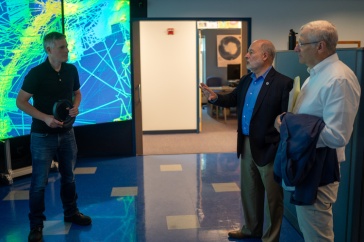
The Deepwater Horizon/BP oil spill, pictured in this image from NOAA, began in the Gulf of Mexico on April 20, 2010, when the BP deep ocean well Macondo blew out. The blow-out resulted in an explosion aboard the drilling rig Deepwater Horizon, killing 11 rig workers. Approximately 4.9 million barrels (nearly 206 million gallons) of crude oil gushed from the seafloor for nearly three months. This incident became the largest oil spill in U.S. history.
?
The Deepwater Horizon/BP oil spill, pictured in this image from NOAA, began in the Gulf of Mexico on April 20, 2010, when the BP deep ocean well Macondo blew out. The blow-out resulted in an explosion aboard the drilling rig Deepwater Horizon, killing 11 rig workers. Approximately 4.9 million barrels (nearly 206 million gallons) of crude oil gushed from the seafloor for nearly three months. This incident became the largest oil spill in U.S. history.
?
It's been 25 years since the Exxon Valdez spilled 11 million gallons of crude oil into Prince William Sound, and nearly five years since the explosion of the Deepwater Horizon oil rig in the Gulf of Mexico gushed 200 million gallons of crude oil. On Oct. 28– 29, nearly 40 experts and eyewitnesses from science, government, industry and NGOs will gather at the University of New Hampshire to look back—and forward— at oil spill response.
The UNH-funded forum, "Oil Spill Response: 25 Years After the Exxon Valdez and in the Wake of Deepwater Horizon, What Have We Learned and What Are We Missing?" is hosted by the UNH Center for Spills in the Environment and the School of Marine Science and Ocean Engineering and is a free public event.
"We've assembled some of the most influential, thoughtful, and challenging figures in the field of oil spill response, many of whom were eyewitnesses to the Exxon Valdez or Deepwater Horizon spills," says forum convener Nancy Kinner, director of the Center for Spills in the Environment and professor of civil and environmental engineering at UNH. "Yet this forum will be far more than a retrospective: Our panelists will be framing those past spills in the context of lessons we can carry forward into future oil spill response."
On Tuesday, Oct. 28, in the Granite State Room of the Memorial Union Building, panels exploring the response to both spills will feature Coast Guard incident commanders Ed Page (Exxon Valdez) and Thad Allen (Deepwater Horizon), as well as other key figures in those events. Discussions will explore the roles scientists and members of the media played in shaping the response to spills and communicating them broadly.
Panels in Huddleston Hall on Wednesday, Oct. 29, will look forward: What will future spills look like? What did we learn from Exxon Valdez and Deepwater Horizon, and how can we use this knowledge to respond to future spills in the Arctic or inland? Discussion will focus on the role of human impacts such as food security, public health, and policy and politics during response.
The forum will conclude with an in-depth discussion of what actions can be taken to improve communications with the public, facilitate scientific research, minimize the intrusion of politics, and consider human impacts during future spill response.
"As we continue to see an increase in oil shipments via rail and pipeline from the West to the coasts, we need to be prepared for accidents when they happen. They're going to happen," says Kinner. "While the volumes of the Exxon Valdez and Deepwater Horizon dwarf the amounts that typically come from oil train or pipeline accidents, we can benefit from the experience we gained from these spills."
Kinner is recognized as a leading independent expert on the fate of spilled oil. During the Deepwater Horizon oil spill, she was sought after for her expertise by hundreds of national media outlets and testified before federal lawmakers three times. In addition, she has taken a leadership role in creating and disseminating scientific knowledge in support of clean-up efforts, convening several high-level meetings among spill responders, scientists, and other stakeholders including in the Gulf of Mexico and Alaska.
The Center for Spills in the Environment (CSE), founded at UNH in 2003, addresses a range of hydrocarbon-based spill topics with stakeholders in government, industry, and academia. It draws on UNH's expertise in marine science, ocean engineering, and environmental science and New Hampshire's independent position as a state with no oil production or refining. The CSE is the sister center to the NOAA-funded Coastal Response Research Center (CRRC), established as a partnership between NOAA and UNH in 2004. Both centers are affiliated with UNH's School of Marine Science and Ocean Engineering.
Want To Attend the Forum?
The oil spill forum is free and open to the public. Visit the event website to find details?and the two-day schedule. You'll also find bios of the all the experts involved in the forum.
?




















































